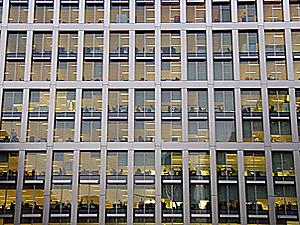 |
| Reviews and Templates for Expression We |
More Companies Now Willing to Pay Extra for Green Office Space

CoreNet Global, an organization for corporate real estate professionals, and commercial real estate services firm Jones Lang LaSalle made the results of their fourth annual Sustainability Survey available yesterday.
Conducted last November, the survey gauges attitudes and trends on sustainability and owned and leased corporate facilities.
Half the respondents now say they are willing to pay more to lease green office space in contrast to 37 percent who said the same in 2009, and 23 percent said they would pay more rent if some of it were offset by lower energy costs.
What’s the tolerance level for premiums on green workspace? Forty-eight percent said they would pay as much as 10 percent more for sustainable space, and 2 percent said they would expect to pay more than that.
Just how important is sustainability to the execs who oversee corporate real estate portfolios? Sixty-four percent said it’s a critical business issue and 92 percent said they consider it when making decisions about locations.
Also, while energy costs continue to be an important sustainability metric, fewer than a third of respondents now say it is their top consideration. Thirty-two percent identified energy costs as their No. 1 concern, compared to 37 percent in 2009. In the meantime, concern for employee health and productivity edged upward with 31 percent saying the factors are an important measure of success; 29 percent deemed them so in 2009. Eleven percent said they now consider employee satisfaction the most important consideration.
“The Sustainability Survey results reflect an evolution that we’re seeing in the industry,” said Dan Probst, chairman of Energy and Sustainability Services at Jones Lang LaSalle, in a statement.
“Five years ago, a corporate real estate executive might have thought sustainability was a costly way to make the company look good to employees,” Probst said.
“Two years ago, that same executive probably focused on energy management as a way to save money in the short run. Today, he or she may be pursuing green strategies that enhance employee productivity.”
Other survey findings include:
- Weighing the options of upgrading owned property or paying more to lease green space, corporate real estate executives are more willing to invest in property they own. Fifty-seven percent considered one to three years as an acceptable payback period for energy efficiency investments; 30 percent said payback periods of three to five years may be acceptable; 9 percent said they’d consider a longer period; and 4 said they expect investments to pay for themselves in a year.
- In administering their portfolio, 88 percent said they consider green building certifications and 87 percent consider energy labels.
- In term of sustainability measures, 65 percent said they focus on energy efficiency programs and 61
|
|
|
|
Copyright 2011 Energy and Technical Services Ltd. All Rights Reserved. Energyts.com |